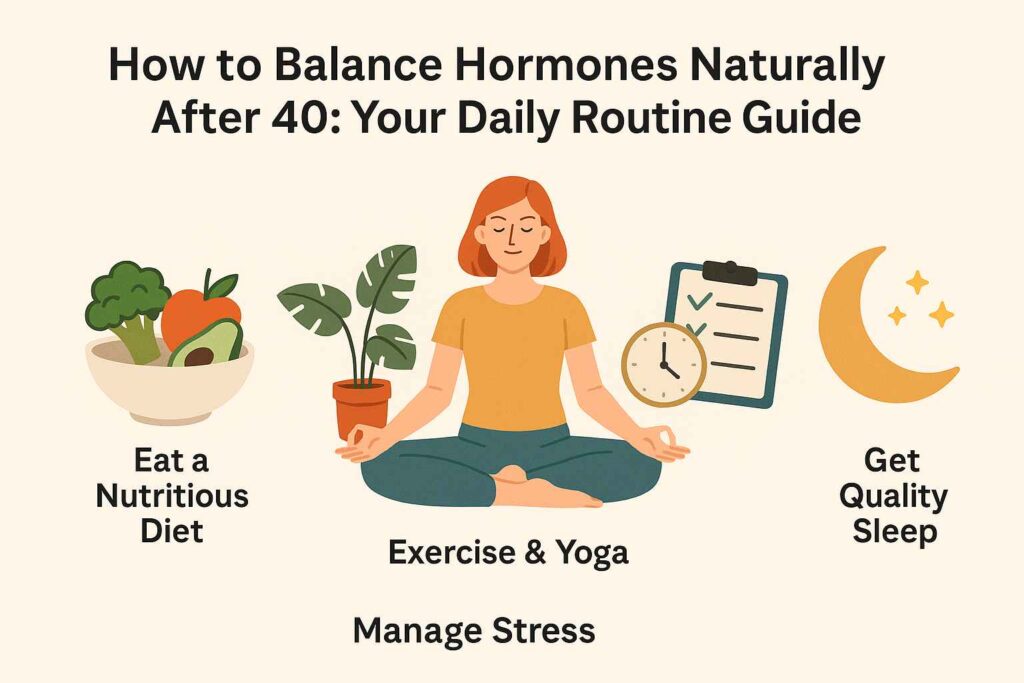As women enter their 40s, it’s common to experience noticeable shifts in energy, mood, sleep, and metabolism — all signs that hormones are changing. While these transitions are a natural part of aging, the good news is that you can take control and support your body through these changes. Creating a daily routine for hormone balance is one of the most effective ways to stay energized, clear-minded, and emotionally grounded.
In this guide, you’ll learn how to balance hormones naturally through small but powerful lifestyle changes. Whether you’re navigating perimenopause or simply looking to feel your best, these tips are designed to support hormone health for women over 40. With the right habits, nourishment, and mindset, natural hormone support is not only possible — it can become part of your everyday life.
Let’s dive into a hormone-balancing daily routine tailored specifically for women 40 and beyond.

Understanding Hormonal Changes After 40 🧬💫
As women move into their 40s, the body begins a natural shift in hormone production that can affect everything from sleep and energy to weight and mood. Understanding what’s happening behind the scenes is the first step toward restoring balance. Here’s what you need to know:
🌡 What Happens to Hormones After 40?
Your body gradually begins producing less estrogen and progesterone, especially during perimenopause — the stage leading up to menopause. At the same time, cortisol (your stress hormone) can become more dominant if not managed properly, contributing to fatigue, weight gain, and mood swings.
🔄 Perimenopause vs. Menopause: What’s the Difference?
- Perimenopause: The transitional years (often starting in your early 40s) where periods become irregular and hormone levels fluctuate.
- Menopause: Officially marked by 12 consecutive months without a menstrual cycle.
Both stages can affect hormone balance and trigger symptoms like hot flashes, sleep issues, and brain fog.
😵 Common Symptoms of Hormonal Imbalance
- Unexplained weight gain, especially around the belly
- Fatigue or lack of motivation
- Mood swings, irritability, or anxiety
- Trouble sleeping or staying asleep
- Low libido
- Irregular periods
🧠 The Role of the Endocrine System
This is your body’s hormone command center — a network of glands (including the thyroid, adrenals, and ovaries) that regulate key functions like metabolism, energy, mood, and reproduction. Supporting this system is crucial for hormone health for women after 40.
Morning Routine to Support Hormone Balance 🌞💪
How you start your morning sets the tone for your entire day — especially when it comes to hormone balance. A few intentional habits can reduce stress, stabilize your mood, and support your endocrine system naturally. Here’s how to make your mornings hormone-friendly:
🌅 Wake With the Sun: Reset Your Circadian Rhythm
Natural light first thing in the morning signals your brain to stop producing melatonin (your sleep hormone) and start producing cortisol — in healthy, energizing amounts. Open your curtains, step outside, or sip your tea on the balcony for at least 10–15 minutes of sunlight.
💧 Hydrate & Nourish: Start with Hormone-Supporting Nutrients
After a night of fasting, your body craves hydration and nutrients that help stabilize blood sugar and fuel your glands:
- Warm lemon water to kickstart digestion
- A smoothie with protein, fiber, and healthy fats
- Magnesium-rich greens or chia seeds to support hormone detox pathways
🤸♀️ Gentle Movement or Stretching
You don’t need a hardcore workout — in fact, too much intensity can spike cortisol. Instead, try:
- Yoga or light stretching
- A brisk walk outdoors
- 10–15 minutes of bodyweight movements or rebounding
These support circulation, mood, and natural energy flow.
🌿 Adaptogens & Supplements
Certain herbs and vitamins help buffer stress and support hormonal harmony:
- Ashwagandha: Balances cortisol and supports thyroid health
- Maca root: May help regulate estrogen and support libido
- Vitamin D: Essential for mood, immune function, and hormone production
(Always check with your doctor before starting supplements.)
Balanced Nutrition for Hormone Health 🥑🍳
What you eat has a direct impact on your hormone production, detoxification, and daily energy levels — especially after 40. As estrogen and progesterone begin to fluctuate, your body becomes more sensitive to blood sugar spikes, inflammation, and nutrient deficiencies. Building your meals with hormone-supportive foods can help you feel grounded, focused, and in control.
Here’s how to nourish your body naturally:
🍽 Focus on Whole, Clean Eating
Minimize processed foods, additives, and preservatives. Instead, fill your plate with:
- Lean proteins (like wild salmon, organic chicken, eggs, legumes) to support hormone synthesis
- Healthy fats (such as avocado, olive oil, flaxseed, nuts) to help create and regulate estrogen and progesterone
- Complex carbs (quinoa, sweet potatoes, brown rice, oats) for steady energy and mood
- Colorful vegetables for antioxidants, fiber, and essential micronutrients
Eating clean helps reduce the load on your liver — the organ responsible for filtering excess hormones and toxins.
🩸 Blood Sugar Balance Is Key
One of the biggest hormone disruptors after 40 is unstable blood sugar. When insulin spikes and crashes, it triggers more cortisol (stress hormone) and can throw off estrogen, progesterone, and even thyroid hormones.
To stabilize blood sugar:
- Eat balanced meals (protein + fat + fiber) every 4–5 hours
- Avoid skipping meals, especially breakfast
- Limit refined sugar and carbs (pastries, soda, white bread)
- Add cinnamon or apple cider vinegar to meals to enhance insulin sensitivity
Keeping your blood sugar in check reduces cravings, fatigue, and hormonal mood swings.
☣️ Avoid Endocrine Disruptors
Certain chemicals in food, packaging, and water can mimic or block hormones, especially estrogen. These are known as xenoestrogens, and they can seriously impact hormone balance.
Watch out for:
- BPA and plastic containers (switch to glass or stainless steel)
- Pesticide-laden produce (choose organic when possible)
- Artificial sweeteners and preservatives
- Hormone-injected dairy or meat
Your liver and endocrine system will thank you for the detox relief!
🥦 Hormone-Supportive Superfoods
Some foods naturally help balance hormones and support your body’s detox systems. Try to include these in your weekly meal plan:
- Flaxseeds: Rich in lignans, which help regulate estrogen
- Cruciferous veggies: Broccoli, cauliflower, Brussels sprouts help detox excess estrogen
- Leafy greens: Full of magnesium and iron for energy and hormone production
- Fermented foods: Like sauerkraut, kimchi, and kefir to support gut health and estrogen metabolism
- Omega-3s: Found in salmon, sardines, chia seeds — great for inflammation and hormone signaling
Balanced nutrition is one of the most empowering tools women over 40 can use to take control of their hormone health. When you nourish yourself with intention, your body responds with clarity, strength, and resilience.
Evening Habits to Reset Hormones Overnight 🌙😴
Just like your morning sets the tone for the day, your evening routine plays a powerful role in hormone repair and regeneration. After 40, sleep becomes more sensitive to hormonal fluctuations, especially with lower levels of progesterone, melatonin, and higher cortisol in the evening. By cultivating calm and prioritizing rest, you can support natural hormone cycles, improve sleep quality, and feel more balanced overall.
Here’s how to create a hormone-friendly evening routine:
📵 Create a Calm, Tech-Free Wind-Down Ritual
Screens emit blue light that disrupts melatonin production — the hormone that tells your body it’s time to sleep. Creating a wind-down window helps lower cortisol and signal to your body that rest is coming.
Try:
- Turning off electronics 1–2 hours before bed
- Reading a book or journaling instead of scrolling
- Dimming lights to mimic sunset and encourage melatonin release
- Taking a warm bath with Epsom salts to ease tension and relax muscles
The calmer your evening, the smoother your transition into deep, healing sleep.
🍵 Magnesium & Herbal Teas for Stress Relief

Magnesium is often referred to as “nature’s chill pill” — and it’s essential for over 300 enzymatic processes in the body, including hormone regulation and nervous system balance.
Natural ways to get it at night:
- Drink a magnesium glycinate supplement or take it in capsule form
- Enjoy herbal teas like chamomile, lavender, lemon balm, or passionflower
- Add foods like dark chocolate, pumpkin seeds, or spinach at dinner
These promote relaxation, reduce nighttime cortisol, and support deeper sleep.
🥗 Light Dinner for Better Digestion & Insulin Control
Eating large, heavy meals late at night can interfere with your body’s ability to repair and regulate hormones — especially insulin, ghrelin, and leptin (which influence metabolism and hunger).
Tips for a hormone-friendly dinner:
- Eat 2–3 hours before bedtime
- Keep it light but nutrient-rich: grilled salmon, steamed veggies, quinoa
- Avoid alcohol, sugar, and refined carbs at night — they spike insulin and disrupt sleep
- Sip warm water or ginger tea after your meal to aid digestion
Your body needs to rest, not digest, while you sleep.
🛌 Sleep Hygiene for Hormonal Regulation
Lack of quality sleep can raise cortisol, disrupt thyroid hormones, and reduce estrogen and progesterone production. Your body repairs and produces the most hormones between 10 p.m. and 2 a.m., so creating a sleep-supportive environment is key.
Best practices:
- Keep your bedroom cool, dark, and quiet
- Use blackout curtains or an eye mask to block light
- Go to bed and wake up at the same time every day (yes, even weekends!)
- Avoid caffeine after 2 p.m. and heavy workouts late in the evening
Aim for 7–9 hours of sleep nightly to allow your body the time it needs for hormonal reset and cellular healing.
Long-Term Lifestyle Shifts for Hormonal Harmony 🧘♀️⏳
While daily habits are powerful, true hormone balance after 40 also requires a long-term commitment to your overall well-being. Think of your hormones as sensitive messengers that respond to your environment, stress levels, nutrition, and mindset. When you make consistent, sustainable lifestyle shifts, your body rewards you with more energy, mental clarity, better sleep, and emotional balance.
Here are key long-term strategies for lasting hormone health:
🧘♀️ Stress Management Is Non-Negotiable
Chronic stress is one of the most common disruptors of hormonal balance — especially for cortisol, thyroid hormones, and progesterone. The goal isn’t to eliminate stress entirely, but to manage it more effectively.
Build in daily stress-relieving practices like:
- Deep breathing or box breathing (5 minutes a day can work wonders)
- Meditation or mindfulness apps like Insight Timer or Calm
- Nature walks or grounding (barefoot in grass or sand)
- Journaling or gratitude lists to regulate emotional energy
Less stress = more hormone harmony.
🏋️♀️ Move with Intention, Not Just Intensity
Exercise is essential for hormone regulation — but the right type of movement matters, especially after 40. Overdoing high-intensity workouts can raise cortisol, exhaust your adrenals, and worsen imbalances.
Focus on:
- Strength training 2–3x/week to support metabolism and bone health
- Low-impact cardio like walking, cycling, or swimming
- Restorative movement: yoga, Pilates, tai chi, or stretching
- Listening to your cycle and energy levels — some days you need sweat, others, rest
Consistency and body-awareness are the keys to long-term success.
🩺 Consider Functional Medicine Testing
If you’ve been dealing with lingering symptoms like fatigue, anxiety, or stubborn weight gain, it might be time to dig deeper. Functional testing can help identify subtle imbalances in:
- Thyroid hormones (TSH, Free T3, Free T4, Reverse T3)
- Cortisol (morning and evening levels)
- Sex hormones (estrogen, progesterone, testosterone, DHEA)
- Vitamin deficiencies (like B12, vitamin D, magnesium)
With accurate insights, you can build a targeted wellness plan with a practitioner.
💊 Know When to Discuss Hormone Replacement Therapy (HRT)
While many women can balance hormones naturally, others may benefit from bioidentical hormone replacement therapy (BHRT) — especially if symptoms are severe or quality of life is affected. It’s not about choosing one path over the other, but about knowing your options and making informed decisions.
Talk to a qualified practitioner about:
- Blood work or saliva tests
- Natural vs synthetic hormones
- Risks, benefits, and alternatives
- Personalized dosage and tracking
Whether you choose herbs, lifestyle changes, or HRT — or a combination — your journey is valid, and your wellness deserves attention.
💡 Final Thought
Your 40s can be a time of incredible power, wisdom, and renewal. By tuning into your body, supporting your hormones naturally, and creating consistent routines, you give yourself the gift of balance — from the inside out.
Conclusion: Your Daily Routine Is Your Hormone Superpower 🌿✨
Balancing hormones after 40 doesn’t require drastic changes — it starts with intentional, nourishing habits practiced day by day. From the moment you wake up to your evening wind-down, every small choice you make can support your body’s natural rhythm and help you feel more energized, emotionally grounded, and in control.
Whether you’re adjusting your nutrition, carving out time for rest, or simply learning to listen to your body’s signals, remember: this is about progress, not perfection. Your hormones are constantly responding to your lifestyle — and now, you have the tools to support them with confidence.
So start small, stay consistent, and celebrate every win along the way. You’ve got this.
Recommended Readings and Expert Advice 📚✨
To further support your hormone health journey, here are some trusted resources and expert insights that can deepen your understanding of hormone balance, nutrition, and lifestyle shifts after 40:
- “The Hormone Cure” by Dr. Sara Gottfried
A comprehensive guide to understanding hormonal changes and natural ways to restore balance using science-backed methods. - “In the Flow” by Alisa Vitti
An empowering book on how to sync your lifestyle, diet, and exercise with your menstrual cycle for optimal hormone health. - “The Menopause Solution” by Dr. Stephanie S. Faubion
An expert-driven guide to navigating the changes of perimenopause and menopause with practical, holistic strategies. - Dr. Christiane Northrup’s Website
Dr. Northrup is a well-known expert in women’s health and menopause. Her website offers articles, podcasts, and expert advice on hormone health after 40. - MindBodyGreen – Hormonal Health Section
MindBodyGreen regularly features expert advice on hormone health, offering articles on nutrition, lifestyle, and supplements for women over 40.
Sources 📚
- Mayo Clinic – Menopause
https://www.mayoclinic.org/healthy-lifestyle - National Institute on Aging – Hormones and Aging
https://www.nia.nih.gov/health/hormones-and-aging - Harvard Health Publishing – Perimenopause and Menopause
https://www.health.harvard.edu/womens-health/perimenopause-and-menopause - WebMD – Hormone Imbalance in Women
https://www.webmd.com/women/guide/hormonal-imbalance-in-women - The Endocrine Society – Hormone Health and Balance
https://www.endocrine.org/topics/hormone-health
These additional readings and expert resources will further guide you in managing your hormones and embracing a balanced lifestyle. Stay informed and empowered on your hormone health journey!


